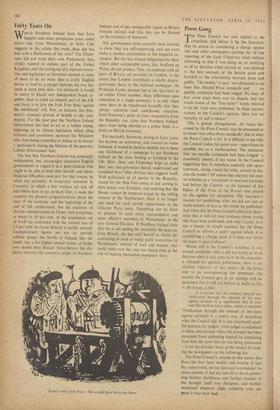Press Gang
rrHE Press Council has now replied to the I complaint, laid before it by the Spectator, that its action in considering a charge against this and other newspapers (arising out of our reporting of the Lady Chatterley trial) without informing us that it was doing so, or notifying us of its decision when arrived at, was inimical to the best interests of the British press and harmful to the relationship between press and public. 'The matter,' it says, 'was discussed as an issue that affected Press standards and . no specific complaint had been lodged No issue of fact arose since there was no dispute that the words [some of the "four-letter" words referred to in the trial] were published. In these circum- stances, in the Council's opinion, there was no necessity to call evidence.'
This is grossly disingenuous. All issues dis- cussed by the Press Council may be presumed to be issues 'that affect Press standards'; that is what the Press Council is for. It is difficult to see why the Council makes this point now—apart from its possible use as a smoke-screen. The statement that 'no specific complaint had been lodged' s manifestly absurd, if not worse. Is the Council suggesting that its members suddenly and spon- taneously, sitting round the table, started to dis- cuss the matter? Of course they did not; the mat- ter (whether as a 'complaint' or not) was formally laid before the Council---at the instance of the Editor of the News of the World—and placed on the agenda for discussion. The Spepator's reasons for publishing what we did are just as much matters of fact as the words we published. And when did the Press Council arbitrarily deter- mine that it will not hear evidence about words that have been published, and why? Lastly. is it not a matter of simple courtesy for the Press Council to inform a paper against which it is considering a charge, even if it does not invite the paper to give evidence?
Worse still is the Council's handling of our second complaint--that it did not notify us of its decision when it had come to it. In the statement it released for general publication, there is no mention whatever of this matter.. In the letter sent to us accompanying the statement, the nearest the Council gets to an apology and an assurance that it will not behave as badly as this in the future, is this: . . . it is correct that the method adopted was
notification through the channel of the news, agency services. It is appreciated that in your
case this method led to delay, which is regretted.' 'Notification through the channel of the hews agency services' is a pretty way of describing what the Council did. It is not considered usual, for instance, for judges—even judges as unjudicial as these, and in cases where the prisoner has been prevented from defending himself by concealing from him the news that he was being prosecuted --to let the prisoner learn of the verdict by read- ing the newspapers on the following day.
The Press Council's attitude in this matter has from the start been shabby and evasive. It had the opportunity, on the Spectator's complaint, to make amends. It has not seen lit to do so, prefer- ring further shabbiness and further evasion. it has brought itself into disrepute, and further weakened whatever slight authority over the press it may have had,














































 Previous page
Previous page